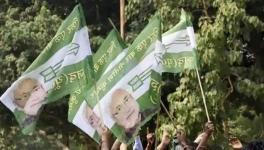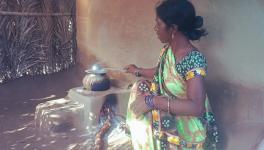COVID-19: Landless Musahars Receive No Help from Govt, Starve Amid Bihar Lockdown
(Left to Right) Meena Devi,Reshmi Devi,Somri Devi,ahesh Manjhi
Baliyari (Bihar): Meena Devi, a middle aged woman sitting on a mud floor outside her one-room thatched hut, is sad and worried about arranging two meals each day for her family of seven. She has neither rice nor money and is yet to get anything from the government--even on the ninth day of the nationwide lockdown.
“Kutch na Sarkar se mil lai hai abhi tak, kam dhandha band hai, humni pass na rupaiya hai na chawal-ata, hum sab bhookhmari ke kagar par haiyo (We have not got anything from the government. There is no work to earn livelihood as everything is closed.We have neither money nor rice or flour; we are on verge of starvation death),” said Meena, who belongs to Mushahar [or Musahar] community, known as one of India's most marginalised communities.
This poverty-stricken, frail-looking Meena, is angry over the apathy of the “sarkar” (government) in providing help to the people like her in times of such unprecedented crisis, following the outbreak of coronavirus. “We heard that the government announced that it will provide food grains and some money to survive to the poor people. But nothing like that has happened. We are in a bad situation,” said the resident of Baliyari Musahari under Mohanpur block, Gaya district.
Meena’s views were echoed by her husband Mahesh Manjhi, a landless farm labourer. “We are without any work since the lockdown has been imposed. Both of us used to work in the fields to earn livelihood, but now, we are sitting idle and the local police have warned us not to step outside. We are struggling with hunger. For how long will we go on like this?” he asked.
There are thousands of poor, landless and illiterate Musahars, particularly women, who are left with nothing to feed to their families across Bihar.
Somri Devi, Reshmi Devi, Devanti Devi, Lakhiya Devi and Renu Devi are all landless Mushahar women. They have one more thing in common--fighting for survival during the lockdown. “We used to work daily, earn daily and eat daily. Now, we are not working and not earning anything. We are running out of money. There is no help from the government so far. We have no other way but to starve,” said thirty-something Reshmi, mother of five children.
Like any other Musahari or Musahar Toli (a small exclusive hamlet) of Musahar community, Baliyari Musahari is a poverty-stricken ghetto of this most deprived community, which has got its name from ‘eating rats’. This hamlet is, like most of the Musaharis, situated on the outskirts of the village.
Reshmi’s husband, Shivrat Manjhi, another landless farm labourer, told NewsClick, “We had purchased 10 kg rice and 7 kg wheat from the local PDS on March 26 by paying from our pocket. There is no free ration for us from the government till date. But now, we are left with no money to buy anything because there is no work available. Harvesting of wheat and other rabi crops has been stalled by land owners.What can we do? Local panchayat representatives are only assuring us that the government will provide food grains as well as money to us.”
Manjhi said that most from his community live with their families in thatched houses, built on gair-majarua (unclaimed government) land because neither they, nor their fathers or grandfathers, owned any land. For generations, they have been earning their livelihood by working as landless agricultural labourers.
Over two dozen Musahar migrant workers had returned to Musahari (this hamlet) from Delhi and other places like thousands of other migrant workers across the state.
Devanti, another Musahar woman of Rajaundha Musahari, in her mid 40s, said, “We are poor, landless and struggling for survival. We are fully dependent on our daily earnings. Livelihood. We can survive for the next two to three days at best. Where is the government’s help?”
Also read: COVID-19 Crisis: Workers and Contractors Dread Imminent Slowdown in Real Estate
Her husband Ram Sagar Manjhi has no idea about COVID-19. He only knows that there is ‘desh-bandi’ (countrywide lockdown) to contain the spread of a mahamari (epidemic). “Abhi sab kutch band hai magar bhookh lagti hai. Sarkar kutch deti to hum bhookhnari se bach pate (Everything is shut, but we do get hungry. If the government can help, it can save us from starvation),” he said.
Last week, Bihar Chief Minister Nitish Kumar announced a Rs 100 crore relief “package” under which one month’s ration will be given for free to all the card holders. Three months’ advance pension will be given immediately to all the beneficiaries of schemes and to differently abled persons, widows, and old age pensioners. He also announced that Rs 1,000 per family will be given to all the ration card-holding families to survive the lockdown. The amount will be transferred to their accounts through Direct Benefit Transfer.
The situation on the ground, however, narrates a different story. After lockdown was enforced, an 11 year-old Musahar boy, Rakesh Manjhi, allegedly died of hunger and lack of medicines in Bhojpur district. The victim’s parents who work as labourers, claimed that they have not received any food or a single penny from the government during the lockdown.
Asharfi Sada, president of the Musahar Vikas Manch--which works to raise awareness among the community--said that most Musahars are landless and hardly have any savings because they earned on a daily basis. “If they die because of coronavirus or not, we don’t know. But one thing is certain; they will die of hunger soon as the government has not provided any help, despite its announcement,” he said.
Sada told NewsClick that dozens of Musahar families have informed him in the past two days that none of them have received anything from the government. “With everything shut and all kinds of labour work stopped, what will they earn and how they will live without it?”
According to Sada, who has conducted several field studies of Musahars, they don't have the facility of safe drinking water and the government has been requesting people to wash their hands with sanitiser or hand wash. “How can one expect Musahar to wash their hands regularly when most of them are living without basic amenities like safe drinking water? Now they will have to fight against hunger,” he said.
He added that Musahars live near roads or railway tracks, dry canals, ahar or any government land, as they don't have land to permanently settle on; they don't have their own land.
Sada is one of the first few Musahars to earn a postgraduate degree in 1991, and has devoted his life for the cause of his community. He strongly stressed on the need for free ration during the lockdown.
The community of landless dalits, derogatorily referred to as ‘rat eaters’ by others, is still considered untouchable. Their socio-economic status has not changed much in recent years.
Over two and half decades ago, most Musahars were bonded labourers working for the rich, landed class; now, they are free from it. In Bihar, 96.3% of Musahars are landless and 92.5% work as farm labourers. The figures have not changed much since the 1980s. Literacy in the community is 9.8%, the lowest among dalits in the country. Hardly 1% of Musahar women are literate.
Anto Joseph, director of Bihar Dalit Vikas Samiti, said that the lockdown would impact Musahars much more than any other community, for the one basic fact – lack of land and other resources to survive.
Joseph, who has been regularly visiting Musahar Toli in Gaya district, to study the socioeconomic condition of Musahars, said: “Many of them failed to apply for ration cards due to lack of documents.The government should ensure food to them during the lockdown.”
The plight of Musahars can be imagined from the fact that they are still not allowed to live anywhere in Bihar except in hamlets earmarked exclusively for them. They live in unhygienic conditions, surrounded by pigs and open piles of filth and garbage around. The community is far, far away from the mainstream and continues to languish at the bottom-most rung of the caste and class hierarchy.
Till date, Bihar has reported 24 confirmed cases of COVID-19 including one death.
Fearing community spread of the novel coronavirus, Bihar government on Tuesday declared a blanket ban on entry of outsiders during the ongoing lockdown.
Also read: Covid-19: Terminally Ill Patients Stare at Unfolding Catastrophe
Get the latest reports & analysis with people's perspective on Protests, movements & deep analytical videos, discussions of the current affairs in your Telegram app. Subscribe to NewsClick's Telegram channel & get Real-Time updates on stories, as they get published on our website.
























